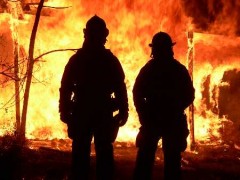“Politicians treat firefighters like pawns. When my house burned down, I learned how valuable public servants can be.”
That’s the tagline of an article on Salon.com titled “Thank God for Taxes.” Naturally the author cannot imagine how firefighting could be better as a private business. It never occurs to him. He just praises public “servants” and calls for more taxes.1
If Andrew Leonard could imagine private firefighting at all, he would probably imagine something like the rival firefighters in 19th century America that fought violently over who would get to put out the fire while the house burned down. But of course, this was caused not by a free market in firefighting but rather a combination of public property (fire hydrants, roads), lack of private property rights enforcement (sabotaged fire engines), and political machines (Tammany Hall) — politicians like Boss Tweed using neighborhood firefighting departments for their own political gain.

let the motherfucker burn!
Or he might imagine private firefighters refusing to put out a fire until the owner paid some astronomical fee, which the owner couldn’t afford on the spot. In fact, he might vaguely recall an incident in Tennessee last December2 in which firefighters let a home burn down because the owner failed to pay a mere $75. “This is what would happen in a free market!” he’d cry, not recalling, or never bothering to learn, the details of the incident. But this was a government firefighting department rigidly adhering to bureaucratic internal rules,3 as government agencies are wont to do, not a private business responding to profit incentives.
I fail to see why the owner couldn’t contractually subscribe to affordable firefighting service with a local company in advance, or why something else, like a payment plan, couldn’t be worked out on the spot.4 Or insurance companies might pay the firefighters, because that would be cheaper than paying out the insurance claim on the house or on surrounding houses that could burn down with it.
But Andrew Leonard is probably doubtful of a free market in fighting fires because he’s an irresponsible risk-taker5 engaging in psychological projection on a massive scale:
Note to mandate-haters: If my mortgage lender hadn’t required that I have home insurance, would I have plunked down that check to Farmers every one of the last 16 years?
This is how leftists really think — that no one would make rational, responsible choices unless forced to do so by someone else.6
Why? Because they recognize in themselves an inclination to make irrational, irresponsible, risky choices7 and project these bad character traits onto everyone else.
This is the animus of much of the nanny state.
Bonus
Prior to the fire, I had no conception of how big an economic event a disaster like mine is for other people. The hubbub of job-creating activity related to my home in the past few weeks has injected instant cash into the local economy — from Santa Rosa down to Watsonville. I am my own Keynesian-stimulus. Want to get the U.S. economy really moving? Burn everything down.
I hope he’s joking, because this is one hell of an example of the broken window fallacy. How stupid and ideologically blinded can you be to believe such nonsense?
“That firefighter deserves a raise. Put it on my next ballot, please.” No. Volunteer your own money, please. Tip him yourself. ↩
Oops, you forgot to pay the required $75 fee! Sorry, no firefighting for you! No, you can’t pay us now. ↩
Another Tennessee county near the one where the aforementioned incidents occurred allows owners to pay for firefighting services on the spot: $2,200 for the first two hours firefighters are on the scene and $1,100 for each additional hour. Ouch. ↩
He didn’t properly maintain his Weber grill, or put out the fire, and initially blames the manufacturer before mentioning his own carelessness. Did he have even one working smoke detector in the house? He doesn’t mention it. In fact, he was woken up not by an alarm but by the sound of the fire itself. ↩
By the by, why assume mortgage lenders wouldn’t require home insurance in a free market? How is this a government mandate? ↩
That’s what all the “addiction” language is about too, I might add: “addicted to high taxes” as the author puts in this article; or addicted to fossil fuels as environmentalists like put it. We’re not in control of or responsible for our own actions, so we need the state to make us do the right thing — to free us from our addictions (well, when the addictions are bad anyway; addiction to high taxes is apparently good). ↩

“Or insurance companies might pay the firefighters, because that would be cheaper than paying out the insurance claim on the house or on surrounding houses that could burn down with it.”
My fiance and I just bought a house in a city in Northeast Ohio. We have an old sign on the front which has a carriage between the letters “U” and “F”. My cousin, in the same city, has the same sign on his house. As it turns out, there used to be signs like this on houses all over our neighborhood and they were symbols that the homeowner had house, or at least, fire insurance. Therefore, when firefighters were private companies, if they showed up to a house with a sign they would put out the fire because they knew they would get compensated, whereas if the house didn’t have a sign and, therefore, didn’t have insurance, it was at their discretion whether they would put the fire out or not. Quite frankly, it’s not that hard to imagine police protection and firefighters privatized.